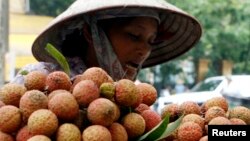The lychee harvest is in full swing in Vietnam's northern Hai Duong province, but local officials say fewer Chinese traders have come to buy the sweet and juicy fruit this summer due to concerns about anti-China sentiment.
Observers say tensions over a Chinese oil rig in disputed waters of the South China Sea are having a negative impact on the economic ties between the two neighbors.
Pham Duc Tuan, a high-ranking official of Thanh Ha district, told VOA’s Vietnamese service that the move to diversify its trading partners is very important while Hanoi and Beijing continue their standoff at sea, causing every aspect of the bilateral relations to deteriorate.
“It applies not only to lychee, but to other fruits as well. It is riskier if we rely too much on any market. If there is something unfavorable, it would have impacts on imports.”
Fruits traditionally grown in the north and exported to China are reportedly piling up in markets in the south, with prices plunging in half as Vietnamese seek to curb their country's dependence on the Chinese market.
To show support for farmers, calls on consumers to purchase local fresh fruits, one of Vietnam’s main exports to China, are inundating social networks.
Vietnamese American economist Alan Phan, who has extensive business experience in both Vietnam and China, said China has dominated Vietnam’s economy, and it is a weapon that Beijing can use to its advantage.
“It is nearly impossible for Vietnam to be economically free from China. Its export products over rely on cheap raw materials from China, so it is difficult to switch to other sources. The incomes of Vietnamese are low, so they prefer inexpensive Chinese goods.”
Vietnamese President Truong Tan Sang was quoted by local media as saying this month that Vietnam should not let itself “depend on any nation in both economics and politics.”
Economists have suggested that tensions over the oil rig could slow Vietnam’s 2014 growth rate.
Beijing’s placement of the drilling platform sparked riots in Vietnam last month, leaving at least two Chinese workers dead and forcing Beijing to carry out mass evacuations of its citizens.
According official statistics, China was Vietnam's largest trading partner with total two-way trade reaching over $50 billion in 2013.
This report was produced in collaboration with the VOA Vietnamese service.
